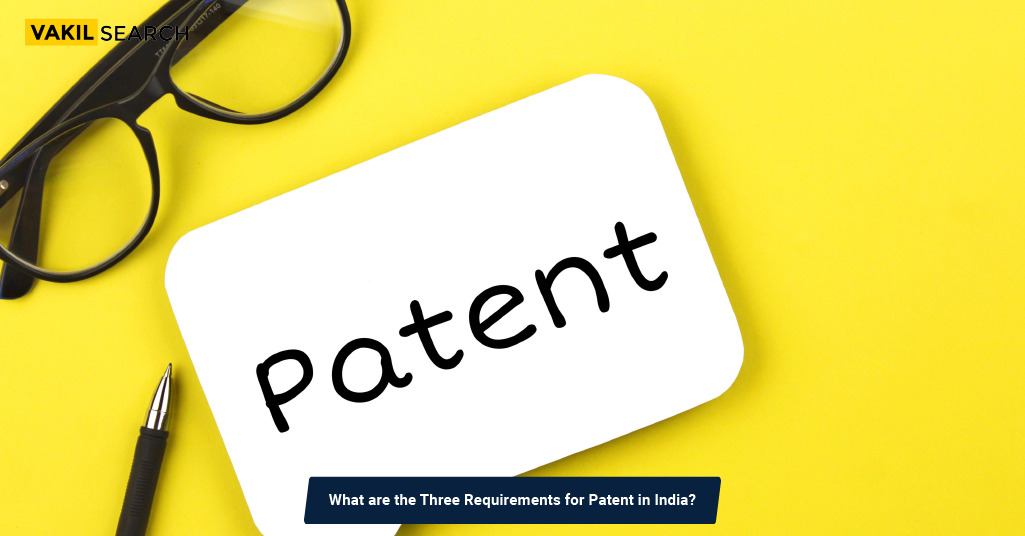Discover the essentials of patenting in India and the significance of meeting requirements with examples. Vakilsearch offers expert assistance for successful patent applications.
Introduction
Patents are essential tools for inventors and businesses to protect their innovations and intellectual property rights. In India, as in many countries, obtaining a patent involves meeting specific requirements set by the government. These requirements serve as the foundation for granting a patent and are crucial for inventors and businesses seeking legal protection for their inventions.
In this article, let’s explore the basics of patenting in India and elaborate on the three key requirements for Patent that must be met: novelty, inventive step, and industrial applicability. Through examples, we will illustrate each requirement and highlight their significance in the patenting process.
Novelty Requirement
The novelty requirement is one of the fundamental criteria for obtaining a patent in India. It essentially means that the invention must be new and not publicly disclosed prior to the filing of the patent application. This requirement prevents the grant of patents for inventions that are already in the public domain.
Example 1: The Tale of Two Inventors
Imagine two inventors, Alice and Bob, who have independently come up with a similar invention – a groundbreaking smartphone with a holographic display. Alice decides to file a patent application for her invention right away, ensuring that her idea is protected and remains confidential. Meanwhile, Bob excitedly shares his invention with friends and industry colleagues before filing a patent application. In this scenario, Alice meets the novelty requirement, while Bob does not. Bob’s public disclosure of his invention before filing for a patent makes it ineligible for protection due to the lack of novelty.
Requirements for Patent: Inventive Step Requirement
The inventive step requirement, also known as non-obviousness, mandates that an invention should not be obvious to a person skilled in the relevant field of technology. In other words, the invention must involve a significant leap forward compared to the existing knowledge or prior art.
Example 2: A Clever Twist in the Gear Mechanism
Consider an engineer, Charlie, who is working on improving the efficiency of a bicycle’s gear mechanism. He studies existing gear designs and realises that there is a common issue of frequent gear slippage during uphill rides. Charlie comes up with a unique gear design that incorporates a magnetic locking system to prevent slippage. This innovation represents an inventive step because it is not an obvious improvement that someone skilled in bicycle mechanics would have easily conceived based on prior art.
Industrial Applicability Requirement
The third essential requirements for Patent in India is industrial applicability. This means that the invention must be capable of being made or used in some kind of industry. In essence, the invention should have practical utility and should not be merely theoretical or speculative.
Example 3: The Biodegradable Plastic
Suppose an inventor named David discovers a new formula for biodegradable plastic. This plastic is not only environmentally friendly but also cost-effective to produce. However, if David cannot demonstrate a practical application for his biodegradable plastic in industries like packaging, agriculture, or consumer goods, his invention would fail to meet the industrial applicability requirement. In this case, David’s invention may be scientifically intriguing but would not be eligible for a patent in India.
Importance of Meeting These Requirements for Successful Patenting
Meeting the three requirements for patentability in India is vital for several reasons:
- Legal Protection: Patents provide inventors with exclusive rights to their inventions, preventing others from making, selling, or using the patented technology without permission. By meeting the requirements, inventors safeguard their innovations from infringement.
- Market Advantage: A granted patent can provide a competitive advantage in the market. It allows inventors to exploit their invention without worrying about copycats and imitators, thereby attracting investors and partners.
- Innovation Promotion: The patent system encourages innovation by rewarding inventors for their efforts. When inventors know their ideas will be protected, they are more likely to invest time and resources in research and development.
- Economic Growth: Patents stimulate economic growth by fostering innovation and attracting investment. They also encourage technology transfer, which can benefit various industries and society as a whole.
- International Recognition: Patents are internationally recognised, allowing inventors to protect their inventions not only in India but also in other countries through the Patent Cooperation Treaty (PCT) and other agreements.
Conclusion
Understanding and meeting the three requirements for Patent in India – novelty, inventive step, and industrial applicability – is essential for inventors and businesses seeking to protect their innovations. These requirements form the backbone of the patent system and ensure that patents are granted to inventions that are genuinely novel, non-obvious, and practically useful.
Vakilsearch plays an important role in assisting inventors and businesses in navigating the complex landscape of patenting. With our expertise and guidance, we help clients understand and fulfill these crucial patent requirements. By partnering with Vakilsearch, inventors not only secure legal protection but also gain access to valuable insights and support throughout the patent application process.
Furthermore, by meeting these requirements with the assistance of Vakilsearch, inventors and businesses contribute to the promotion of innovation, economic growth, and technological advancement in India and beyond. Therefore, anyone embarking on the journey of patenting should carefully consider these requirements and work diligently to fulfill them.




